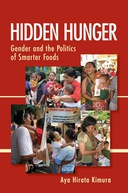Explore
For decades, NGOs targeting world hunger focused on ensuring that adequate quantities of food were being sent to those in need. In the 1990s, the international food policy community turned its focus to the “hidden hunger” of micronutrient deficiencies, a problem that resulted in two scientific solutions: fortification, the addition of nutrients to processed foods, and biofortification, the modification of crops to produce more nutritious yields. This hidden hunger was presented as a scientific problem to be solved by “experts” and scientifically engineered smart foods rather than through local knowledge, which was deemed unscientific and, hence, irrelevant. In Hidden Hunger, Aya Hirata Kimura explores this recent emphasis on micronutrients and smart foods within the international development community and, in particular, how the voices of women were silenced despite their expertise in food purchasing and preparation.
This book is included in DOAB.
Why read this book? Have your say.
You must be logged in to comment.
Rights Information
Are you the author or publisher of this work? If so, you can claim it as yours by registering as an Unglue.it rights holder.Downloads
This work has been downloaded 1184 times via unglue.it ebook links.
- 214 - pdf (CC BY-NC-ND) at OAPEN Library.
- 310 - mobi (CC BY-NC-ND) at Unglue.it.
- 181 - pdf (CC BY-NC-ND) at Unglue.it.
- 257 - epub (CC BY-NC-ND) at Unglue.it.
Keywords
- Asia
- Cultural Studies
- Development
- Enriched foods
- Food & society
- Food habits
- food policy
- Golden rice
- Indonesia
- KUnlatched
- Malnutrition
- micronutrient
- NGOs
- Nutrition
- Nutrition policy
- Prevention
- Social Science / Women's Studies
- Society & culture: general
- Society & Social Sciences
- Sociology
- thema EDItEUR::J Society and Social Sciences::JB Society and culture: general::JBC Cultural and media studies::JBCC Cultural studies::JBCC4 Cultural studies: food and society
- Trace elements in nutrition
- Wheat flour
- Women
Links
DOI: 10.7591/cornell/9780801451645.001.0001Editions

